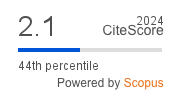DPSO: A Hybrid Approach for Load Balancing using Dragonfly and PSO Algorithm in Cloud Computing Environment
DOI:
https://doi.org/10.4108/eetiot.4826Keywords:
Resource allocation, Load Balancing, Cloud Computing, Dragonfly Algorithm, PSO, Hybrid modelAbstract
Load balancing is one of the promising challenges in cloud computing system. For solving the issues, many heuristic, meta heuristic, evolutionary and hybrid algorithms have been proposed by the researchers. Still, it is under way of research for finding optimal solution in dynamic change in behaviour of task as well as computing environments. Attempts have been made to develop a hybrid framework to balance the load in cloud environment by obtain the best fitness value. To achieve an optimal resource for load balancing, the proposed framework integrates Dragonfly (DF) and Particle Swarm Optimization (PSO) algorithm. The performance of the proposed method is compared with PSO and Dragonfly algorithm. The performance is evaluated in different measures such as best fitness value, response time by varying the user base and response time. The user bases are varied from 50, 100, 500, and 1000. Similarly, the population size has been varied to observe the performance of the algorithm. It is observed that the proposed method outperforms the other approached for load balancing. The statistical analysis and standard testing also validate the relative superiority of PSO a considerable Dragonfly Algorithm. The hybrid approach provides better response time.
Downloads
References
Rahman, C. M., Rashid, T. A., Alsadoon, A., Bacanin, N., Fattah, P., & Mirjalili, “A survey on dragonfly algorithm and its applications in engineering”. Evolutionary Intelligence, 16(1), 1-21, (2023).
Rahman, C. M., & Rashid, T. A. “Dragonfly algorithm and its applications in applied science survey”. Computational Intelligence and Neuroscience, 2019, (2019).
Hammouri, A. I., Mafarja, M., Al-Betar, M. A., Awadallah, M. A., & Abu-Doush, I. “An improved dragonfly algorithm for feature selection.” Knowledge-Based Systems, 203, 106131, (2020).
Song, J., & Li, S. “Elite opposition learning and exponential function steps-based dragonfly algorithm for global optimization.” In 2017 IEEE International Conference on Information and Automation (ICIA) (pp. 1178-1183), (2017).
Neelima, P., & Reddy, A. R. M. “An efficient load balancing system using adaptive dragonfly algorithm in cloud computing.” Cluster Computing, 23, 2891-2899, (2020).
Emambocus, B. A. S., Jasser, M. B., Mustapha, A., & Amphawan, A. “Dragonfly algorithm and its hybrids: A survey on performance, objectives and applications.” Sensors, 21(22), 7542, (2021).
KS, S. R., & Murugan, S. “Memory based hybrid dragonfly algorithm for numerical optimization problems.” Expert Systems with Applications, 83, 63-78, (2017).
Singh, A. P., Kumar, G., Dhillon, G. S., & Taneja, “Hybridization of chaos theory and dragonfly algorithm to maximize spatial area coverage of swarm robots”. Evolutionary Intelligence, 1-14, (2023).
Zhong, L., Zhou, Y., Zhou, G., & Luo, Q. “Enhanced discrete dragonfly algorithm for solving four-color map problems”. Applied Intelligence, 53(6), 6372-6400, (2023).
Boonyaprapasorn, A., Kuntanapreeda, S., Ngiamsunthorn, P. S., Kumsaen, T., & Sethaput, T. “Time-varying sliding mode controller for heat exchanger with dragonfly algorithm”. International Journal of Electrical and Computer Engineering (IJECE), 13(4), 3958-3968, (2023).
George, D. T., Raj, R. E., Rajkumar, A., & Mabel, M. C. “Optimal sizing of solar-wind based hybrid energy system using modified dragonfly algorithm for an institution”. Energy Conversion and Management, 283, 116938, (2023).
Díaz-Cortés, M. A., Ortega-Sánchez, N., Hinojosa, S., Oliva, D., Cuevas, E., Rojas, R., & Demin, A. “A multi-level thresholding method for breast thermograms analysis using Dragonfly algorithm”. Infrared Physics & Technology, 93, 346-361, (2018).
Ghosh, H., Tusher, M.A., Rahat, I.S., Khasim, S., Mohanty, S.N. (2023). Water Quality Assessment Through Predictive Machine Learning. In: Intelligent Computing and Networking. IC-ICN 2023. Lecture Notes in Networks and Systems, vol 699. Springer, Singapore. https://doi.org/10.1007/978-981-99-3177-4_6
Alenezi, F.; Armghan, A.; Mohanty, S.N.; Jhaveri, R.H.; Tiwari, P. Block-Greedy and CNN Based Underwater Image Dehazing for Novel Depth Estimation and Optimal Ambient Light. Water 2021, 13, 3470. https://doi.org/10.3390/w13233470
G. P. Rout and S. N. Mohanty, "A Hybrid Approach for Network Intrusion Detection," 2015 Fifth International Conference on Communication Systems and Network Technologies, Gwalior, India, 2015, pp. 614-617, doi: 10.1109/CSNT.2015.76.
Downloads
Published
Issue
Section
License
Copyright (c) 2024 EAI Endorsed Transactions on Internet of Things

This work is licensed under a Creative Commons Attribution 3.0 Unported License.
This is an open-access article distributed under the terms of the Creative Commons Attribution CC BY 4.0 license, which permits unlimited use, distribution, and reproduction in any medium so long as the original work is properly cited.




